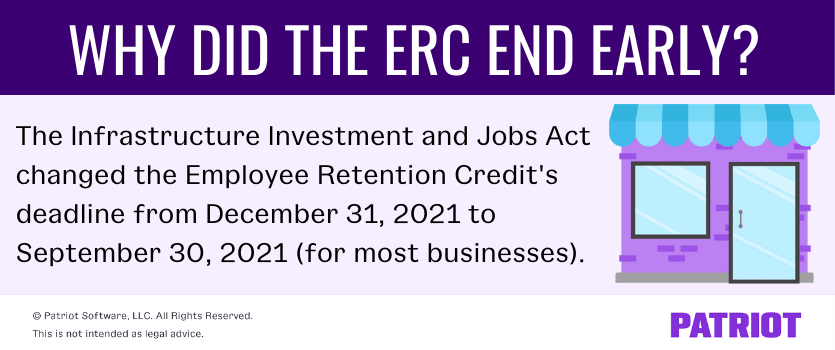The November 2021 Infrastructure Investment and Jobs Act ended the Employee Retention Credit (ERC) program earlier than expected. Originally slated to expire December 31, 2021, the ERC ended retroactively for most businesses on September 30, 2021. With the ERC ending early, employers probably have questions about deposits—and penalties.
IRS Notice 2021-65 answers those questions. And, we’re here to help explain what it all means. Read on to learn more about the premature ending of the ERC and what it means for employers who already reduced their tax deposits.
Overview of the Employee Retention Credit
The Employee Retention Tax Credit (ERTC) was a CARES Act relief measure for qualifying businesses that kept employees on payroll. And in December 2020, the Consolidated Appropriations Act extended the tax credit.
So, here’s a brief recap on how the ERC worked in 2021 under the Consolidated Appropriations Act extension:
- Employers could claim a fully refundable tax credit for keeping employees on payroll
- The tax credit was equal to 70% of qualified wages (up to $10,000 per employee, per quarter) eligible employers paid employees
- The maximum credit per full-time employee per quarter in 2021 was $7,000
- Employers claimed the credit on their federal employment tax returns (e.g., Form 941)
- Some employers could request a tax credit advance using Form 7200
Employers could have claimed a maximum tax credit of $28,000 per employee in 2021 ($7,000 X 4 quarters). However, the ERC ended one quarter early, reducing the maximum tax credit to $21,000 ($7,000 X 3 quarters) per employee.
Background on the ERC ending early
On November 15, 2021, the president signed the Infrastructure Investment and Jobs Act into law. The bill changed the expiration date of the ERTC from December 31, 2021 to September 30, 2021 for most businesses.

The exception? Recovery Startup Businesses can still claim the ERC through December 31, 2021. A “Recovery Startup Business” is an employer that began operations on or after February 15, 2020 and has average annual gross receipts under $1 million.
Because the infrastructure bill didn’t become law until November 15, there was some confusion about the retroactive ending of the ERC program. Many employers already reduced tax deposits based on their tax liability with the tax credit. And if you use full-service payroll software, your provider likely collected less in taxes than you now owe with the early ERC deadline. Not to mention, some employers received advance payments from the IRS.
Long story short, there’s been some confusion and panic about failure-to-deposit penalties…
…Until the IRS released Notice 2021-65.
Want to be in-the-know?
Get the latest payroll news delivered straight to your inbox.
Subscribe to Email ListPenalties and the ERTC ending early
The IRS addressed employers’ questions about ERC-related penalties in Notice 2021-65. So, could you be subject to a failure-to-deposit penalty due to the tax law change?
The answer may depend on whether you:
- Received advance payments
- Reduced employment tax deposits
Employers who received advance payments
Did you receive advance payments for fourth-quarter wages in 2021? To avoid a failure-to-pay penalty, you must:
- Repay the advance amounts by the due date of your employment tax return.
Employers who reduced employment tax deposits
Did you reduce tax deposits on or before December 20, 2021 that were related to wages paid between October 1, 2021 and December 31, 2021? If so, the IRS may waive failure-to-deposit penalties.
You may qualify for the IRS ERC-related penalty waiver if you:
- Reduced tax deposits in anticipation of the Employee Retention Credit (consistent with the IRS’s rules in Notice 2021-24),
- Deposit the amounts you initially retained in anticipation of the ERC on or before the due date for wages paid on December 31, 2021 (your deposit due dates depend on your deposit schedule), AND
- Report the tax liability resulting from the termination of the ERC on your employment tax return (e.g., Form 941) or schedule that includes the period from October 1, 2021 through December 31, 2021.
Keep in mind that you will be subject to IRS penalties if you reduce deposits after December 20, 2021.
Don’t qualify for the IRS penalty waiver? You may qualify for “reasonable cause” relief. To apply for a penalty reduction or removal, you can reply to an IRS penalty notice with an explanation of your situation.
This is not intended as legal advice; for more information, please click here.


